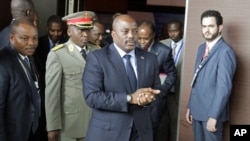December 19 marks the end of President Joseph Kabila's second five-year term in the Democratic Republic of the Congo, and many in the country are nervous as the date approaches.
Elections were to have been held this year but have not been organized. Kabila now plans to remain in office until polls can be held in 2018. A large opposition coalition known as the Rassemblement views the president's prolonged second and, under the constitution, final term as a power grab. This group wants him to leave at the end of his mandate, and it calls for elections in 2017.
The lack of common ground between the parties has observers fearing a repeat of September 19, when a Rassemblement demonstration in Kinshasa descended into violence. The United Nations says security forces killed more than 50 people over two days.
The U.S. government and others in the international community support the National Episcopal Conference of Congo (CENCO), the influential body which represents the Catholic Church and has been working to find a compromise.
Tom Perriello, the U.S. special envoy to the Great Lakes region who was in Kinshasa to meet with Kabila and others, told VOA on Tuesday that "our most urgent message is the absolute importance of full cooperation with the CENCO process run by the Catholic bishops to try to organize a broad consensus among the key stakeholders on how we can move forward. ... Even though we're in the 91st minute of stoppage time, the reality is that there is still a bit of time on the clock here for the sides to come together."
Last week, it appeared the church's efforts had failed when Kabila's political alliance, the "presidential majority," walked away from the mediation. But this week, the president reaffirmed his support for the process.
"It was unfortunate that key members of the majority declared it dead, but perhaps fittingly for the bishops, it was resurrected on the third day and we're back at it," Perriello said. "So I think partly as a matter of faith, we are going to continue to support this process in its entirety up until December 19 in the hope that there can be a breakthrough."
Blame for both camps
Perriello said the situation need not have reached this dangerous stage, and that both sides deserved some blame.
"But we've also been very clear publicly and privately with President Kabila that a statement 18 months ago or 12 months ago or six months ago, stating with absolute clarity what remains crystal clear in the constitution, would have been incredibly constructive, de-escalatory and created much more space for dialogue," he said.
Early this week, the head of the U.N. mission in the DRC warned of the possibility of a "major outbreak of politically related violence" on December 19. Perriello noted that when there was political violence in Burundi, Washington imposed sanctions on individuals from both the government and opposition.




